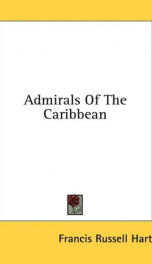admirals of the caribbean

The romantic interest which attaches to the waters of the Caribbean has to some extent obscured the fact that the records of the Caribbean during the sixteenth, seventeenth, and eighteenth centuries are an integral history of England and of the American colonies. Battles fought in the Caribbean Sea were often an important factor in making peace or war in Europe. Not only were settlements established in the West Indies and in the Spanish Main a century in advance of those in North America, but for three hundred years the struggles of the European nations for the control of the commerce of this region had a direct effect upon the material, political, and racial development of the North American colonies. During the last quarter of the sixteenth century, Spain was the strongest of European powers. In the New World, Spanish rule was practically absolute from Labrador to the Rio de la Plata on the Atlantic side and from the Isthmus south on the western coast of South America; in fact a Papal grant had divided the American continent between Portugal and Spain. The arrogant claim of the Spanish Crown was contested only by a small French settlement on the St. Lawrence and in Labrador by Frobisher's Adventure. The story of the great seamen of Elizabeth's reign - Drake, Hawkins, and Frobisher - is almost the history of the England of their day; the battles they fought made the settlements in Virginia and Massachusetts possible. Of no less influence in the development of the English colonial settlements were the naval undertakings of Sir Henry Morgan in the seventeenth, and of Admiral Vernon and Admiral Rodney in the eighteenth century. It was the final supremacy of British control of the Caribbean Sea which made the Rio Grande the northern boundary of Latin America instead of the Potomac. --This text refers to the Paperback edition.
Info about the book
Author:
Series:
Unknown
ASIN:
B002WTVVZU
Rating:
3/5 (1)Your rating:
0/5
Languge:
English
Users who have this book
Users who want this book
What readers are saying
What do you think? Write your own comment on this book!
write a commentif you like admirals of the caribbean try:
Other books by this author
Do you want to read a book that interests you? It’s EASY!
Create an account and send a request for reading to other users on the Webpage of the book!


